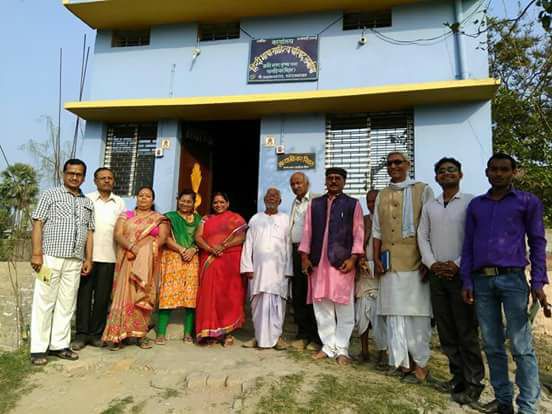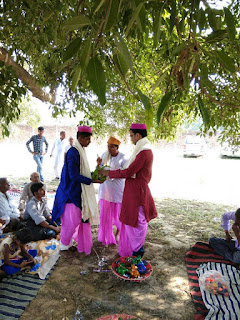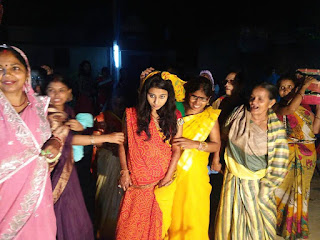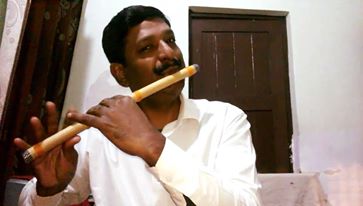'मास्टर' - अंगिका कविता
बिहारी धमाका / بہاری دھماکا - A blog in English, हिन्दी, اردو, मैथिली, भोजपुरी, मगही, अंगिका and बज्जिका. / Contact us at editorbejodindia@gmail.com (IT'S LINKS CAN NOT BE SHARED ON FACEBOOK but CAN BE SHARED IN WHATSAPP, TWITTER etc.) (For full view, open the blog in web/desktop version by clicking on the option given at the bottom.)
**New post** on See photo+ page
बिहार, भारत की कला, संस्कृति और साहित्य.......Art, Culture and Literature of Bihar, India ..... E-mail: editorbejodindia@gmail.com / अपनी सामग्री को ब्लॉग से डाउनलोड कर सुरक्षित कर लें.
# DAILY QUOTE # -"हर भले आदमी की एक रेल होती है/ जो माँ के घर तक जाती है/ सीटी बजाती हुई / धुआँ उड़ाती हुई"/ Every good man has a rail / Which goes to his mother / Blowing wistles / Making smokes [– आलोक धन्वा, विख्यात कवि की एक पूर्ण कविता / A full poem by Alok Dhanwa, Renowned poet]
यदि कोई पोस्ट नहीं दिख रहा हो तो ऊपर "Current Page" पर क्लिक कीजिए. If no post is visible then click on Current page given above.
Friday 30 June 2017
'मास्टर'- अंगिका कविता अंग्रेजी काव्यानुवाद के साथ / कवि- कैलाश झा किंकर ('Master'- Angika poem of Kailash Jha Kinkar with poetic English translation)
'मास्टर' - अंगिका कविता
Saturday 24 June 2017
कुमार पंकजेश की गज़ल-1 अंग्रेजी काव्यानुवाद के साथ (Hindi poem of Kumar Pankajesh with poetic English translation)
Friday 23 June 2017
मिथिला विवाह के चित्र (Pictures of Mithila marriage ceremony)
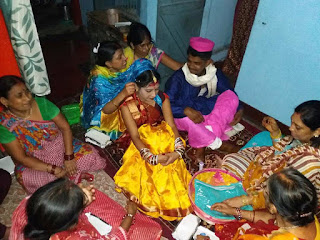 |
| Pic-2: Siddhant |
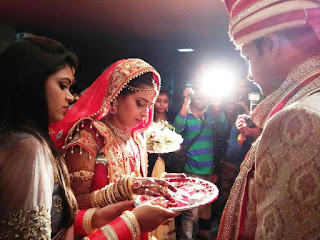 |
| Pic-5: |
 |
| Pic-6 (Jayamala) |
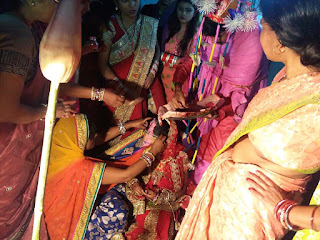 |
| Pic-7
In picture 7, the head of the bride is anointed with a kind of 'sindoor' in the ritul of Chaturthi. It is noteworthy that the bridegroom is expected to stay at bridegroom's house for at least four days before leaving for his own village with the bride.
चित्र संक्या 7 में चतुर्थी की रस्म में वधु का सिर एक प्रकार के सिंदूर से लेपा जा रहा है. ध्यातव्य है कि दूल्हे से आशा की जाती है कि वधु को अपने साथ ले जाने के पहले वह कमसे कम चार दिनों तक ससुराल में रहे और चतुर्थी पूजन के बाद ही वधु को लेकर अपने गाँव जाये.
|
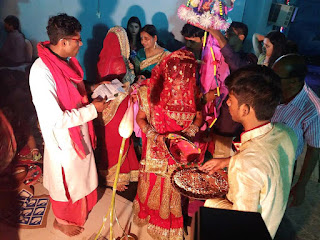 |
| Pic-8 |
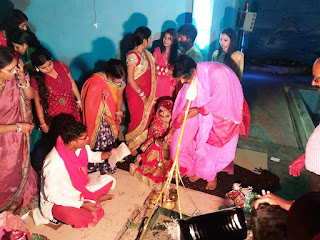 |
| Pic-9 |
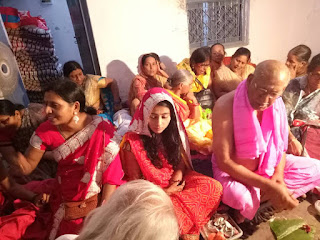 |
| Pic-10 |
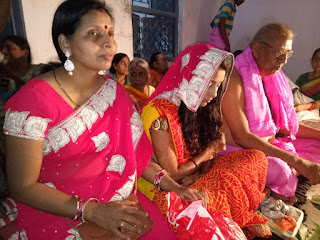 |
| Pic-11 |
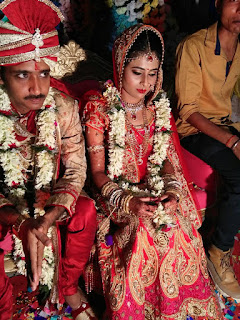 |
| Pic-12: |
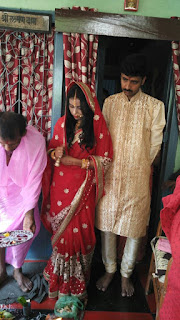 |
| Pic-13: Pujan |
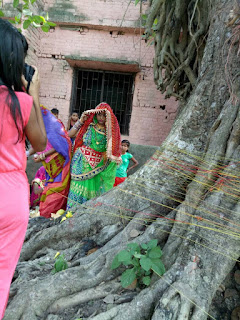 |
| Pic-14: Vat-vriksha pujan
Picture No. 14 shows as in the ceremony of 'Barsaiat' (Vat-savitri pujan) ceremony the banyan tree is worshipped.
चित्र संख्या 14 में 'वरसाइत ('वट-सावित्री पूजन) विवाह के कुछ दिनों बाद होता है जब वर के पेड़ को पूजा जाता है.
|
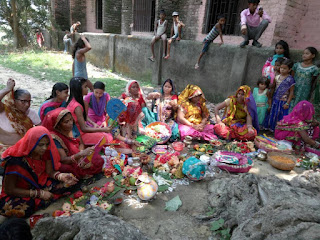 |
| Pic-15: Vat-vriksh pujan |
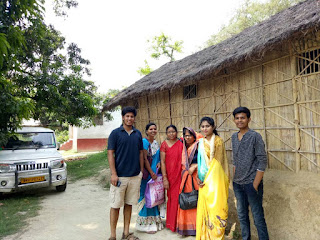 |
Pic-16
चित्र सौजन्य: शंकर एवम शिखा / Photos courtesy : Shankar and Shikha
Send your response to hemantdas_2001@yahoo.com
|
Thursday 22 June 2017
'स्वजन' रचित बिना मात्रा की मैथिली कविता और उसका अंग्रेजी काव्यानुवाद (Maithili poem of 'Swajan' without vowels with poetic English translation)
शिव-स्तुति (बिनु मात्रा केँ) / कवि- खड्ग बल्लभ दास 'स्वजन'
 |
| (Late) Khad Ballabh Das 'Swajan' with his wife (Late) Indra Maya Devi |
............
 |
| https://books.google.co.in/books/about/Seeta_Sheel.html?id=8RodmX5cs1sC&redir_esc=y |
Monday 19 June 2017
दरभंगा जिला (बिहार) के मैथिली गायक सुन्दरम की दिल्ली में धूम / Delhi rocks by the Maithili singing by Sundaram of Darbhanga (Bihar)
(English text follows Hindi text)
https://youtu.be/eOx-HzJLWio
https://youtu.be/xlXRbxqkCyk
https://youtu.be/qAqfqMZL4V8

 |
| Singer Sundaram with his wife Prabha Chaoudhary |
घमण्डी राम की मगही पुस्तकों का लोकार्पण पटना में 17.6.2017 को सम्पन्न -लता पराशर की रिपोर्ट
 पटना के जमाल रोड में स्थित बिहार माध्यमिक शिक्षक संघ के सभागार में 17.6.2017 को मगही के प्रसिद्ध रचानाकार घमण्डी राम की दो पुस्तकों का लोकार्पण हुआ. ये पुस्तके हैं 'कजरिया' (कहानी-संग्रह) और 'ढाई आखर प्रेम का'. इस अवसर पर मगही और हिन्दी के अनेक जाने-माने साहित्यकार उपस्थित थे. उनमें से कई ने अपने विचार मगही में प्रकट किये जबकि कुछ ने हिन्दी में अपनी बातों को रखा. तैयब हुसैन ने कहा कि शास्त्र और लोक दोनो तत्वों से साहित्य की रचना होती है. अब यह पुराना भ्रम टूट चुका है कि शास्त्रीय साहित्य ही साहित्य है.
पटना के जमाल रोड में स्थित बिहार माध्यमिक शिक्षक संघ के सभागार में 17.6.2017 को मगही के प्रसिद्ध रचानाकार घमण्डी राम की दो पुस्तकों का लोकार्पण हुआ. ये पुस्तके हैं 'कजरिया' (कहानी-संग्रह) और 'ढाई आखर प्रेम का'. इस अवसर पर मगही और हिन्दी के अनेक जाने-माने साहित्यकार उपस्थित थे. उनमें से कई ने अपने विचार मगही में प्रकट किये जबकि कुछ ने हिन्दी में अपनी बातों को रखा. तैयब हुसैन ने कहा कि शास्त्र और लोक दोनो तत्वों से साहित्य की रचना होती है. अब यह पुराना भ्रम टूट चुका है कि शास्त्रीय साहित्य ही साहित्य है. |
| लता पराशर |
आलेख: लता पराशर
प्रस्तुति और छायाचित्र: हेमन्त दास 'हिम'
अन्य जानकारी या सुधार के सुझाव इ-मेल द्वारा भेजें : hemantdas_2001@yahoo.com
 |
| Ghamandi Ram (middle) |
 |
| Sriram Tiwari (standing) |
 |
| From left no.3- Bhagwati Pd Dwivedi, 4- Harender Sinha, 6- Rakesh Priyadarshi, 7- Anand Kishore Shastri |



